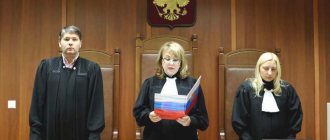Inheritance of debts
1. GENERAL PROVISIONS
1.1. This Privacy Policy regarding the processing of personal data of users of the site https://www.dvitex.ru/ (hereinafter referred to as the Privacy Policy) was developed and applied by Legal LLC, OGRN 1107746800490, Moscow, per. Golutvinsky 1st, building 3-5, office 4-1 (hereinafter referred to as the Operator) in accordance with paragraphs. 2 hours 1 tbsp. 18.1 of the Federal Law of July 27, 2006 No. 152-FZ “On Personal Data” (hereinafter referred to as the Law on Personal Data).
1.2. This Privacy Policy defines the Operator’s policy regarding the processing of personal data accepted for processing, the procedure and conditions for the processing of personal data of individuals who have transferred their personal data for processing to the Operator (hereinafter referred to as personal data subjects) with and without the use of automation tools, establishes procedures aimed at preventing violations of the legislation of the Russian Federation, eliminating the consequences of such violations related to the processing of personal data.
1.3. The privacy policy was developed to ensure the protection of the rights and freedoms of personal data subjects when processing their personal data, as well as to establish the responsibility of the Operator's officials who have access to the personal data of personal data subjects for failure to comply with the requirements and standards governing the processing of personal data.
1.4. Personal data of the Personal Data Subject is any information relating to a directly or indirectly identified or identifiable individual.
1.5. The Operator processes the following personal data of Users:
- Full Name;
- E-mail address;
- Phone number;
- other data necessary for the Operator when providing services to Users to ensure the functioning of the Site.
1.6. The Operator processes personal data of Personal Data Subjects for the following purposes:
- providing the opportunity for feedback from Operator Specialists on User requests;
- providing the possibility of online payment for services ordered on the Site;
- ensuring the fulfillment of the Operator’s obligations to Users;
- for market research purposes;
- informing the Personal Data Subject about promotions, competitions, special offers, new services, discounts, advertising materials and other services, as well as receiving commercial or advertising information and free products, participating in exhibitions or events, performing marketing research and notification of all special initiatives for clients;
- statistical purposes;
- for other purposes, if the corresponding actions of the Operator do not contradict the current legislation, the activities of the Operator, and the consent of the Personal Data Subject has been obtained for the said processing.
1.7. The operator processes personal data of personal data subjects by performing any action (operation) or set of actions (operations) performed using automation tools or without the use of such means, including the following:
- collection;
- record;
- systematization;
- accumulation;
- storage;
- clarification (update, change);
- extraction;
- usage;
- transmission (distribution, provision, access);
- depersonalization;
- blocking;
- deletion;
- destruction.
2. PRINCIPLES FOR PROCESSING PERSONAL DATA
2.1. When processing personal data, the Operator is guided by the following principles:
- legality and justice;
- confidentiality;
- timeliness and reliability of obtaining the consent of the subject of personal data for the processing of personal data;
- processing only personal data that meets the purposes of their processing;
- compliance of the content and volume of processed personal data with the stated purposes of processing. The personal data processed should not be redundant in relation to the stated purposes of their processing;
- the inadmissibility of combining databases containing personal data, the processing of which is carried out for purposes incompatible with each other;
- storing personal data in a form that allows identifying the subject of personal data for no longer than required for the purposes of processing personal data;
- destruction or depersonalization of personal data to achieve the goals, their processing or in case of loss of the need to achieve these goals.
2.2. The processing of personal data by the Operator is carried out in compliance with the principles and rules provided for:
- Federal Law of July 27, 2006 No. 152-FZ “On Personal Data”;
- This Privacy Policy;
- Universal Declaration of Human Rights 1948;
- International Covenant on Civil and Political Rights 1966;
- European Convention for the Protection of Human Rights and Fundamental Freedoms, 1950;
- The provisions of the Convention of the Commonwealth of Independent States on Human Rights and Fundamental Freedoms (Minsk, 1995), ratified by the Russian Federation on August 11, 1998;
- The provisions of the Okinawa Charter for the Global Information Society, adopted on July 22, 2000;
- Decree of the Government of the Russian Federation dated November 1, 2012 No. 1119 “On approval of requirements for the protection of personal data during their processing in personal data information systems”;
- Order of the FSTEC of Russia dated February 18, 2013 No. 21 “On approval of the composition and content of organizational and technical measures to ensure the security of personal data when processed in personal data information systems”;
- Other regulatory and non-regulatory legal acts governing the processing of personal data.
3. OBTAINING PERSONAL DATA.
3.1. Personal data of personal data subjects is obtained by the Operator:
- by providing the subject with personal data when registering on the Site, when submitting applications, applications, questionnaires, forms, filling out registration forms on the Operator’s website or sending by e-mail, messages by telephone to the Operator’s support service;
- by other means that do not contradict the legislation of the Russian Federation and the requirements of international legislation on the protection of personal data.
3.2. The Operator receives and begins processing the Subject’s personal data from the moment of receiving his consent.
3.3. Consent to the processing of personal data is given by the subject of personal data from the moment of starting to use the site, including by indicating about, through the performance of implied actions by the subject of personal data.
3.4. The subject of personal data may at any time withdraw his consent to the processing of personal data. To revoke consent to the processing of personal data, you must submit a corresponding application to the Operator via available means of communication. At the same time, the Operator must stop processing them or ensure the termination of such processing and, if the preservation of personal data is no longer required for the purposes of their processing, destroy personal data or ensure their destruction within a period not exceeding 30 (Thirty) days from the date of receipt of the specified review .
3.5. If the Personal Data Subject withdraws consent to the processing of personal data, the Operator has the right to continue processing personal data without the consent of the Personal Data Subject only if there are grounds specified in the Personal Data Law.
3.6. The subject of personal data has the right to choose what personal data will be provided to him. However, in case of incomplete provision of the necessary data, the Operator does not guarantee the subject’s ability to use all services and products of the Site, to use all services of the Site.
3.7. The personal data subject can view, update or delete any personal data included in his profile at any time. To do this, he can edit his profile online in his personal account or send an email to
4. PROCESSING PROCEDURE FOR PERSONAL DATA
4.1. The operator takes technical, organizational and legal measures to ensure the protection of personal data from unauthorized or accidental access, destruction, modification, blocking, copying, distribution, as well as from other unlawful actions.
4.2. When processing personal data, the Operator applies legal, organizational and technical measures to ensure the security of personal data in accordance with Art. 19 of the Federal Law “On Personal Data”, Decree of the Government of the Russian Federation dated November 1, 2012 No. 1119 “On approval of requirements for the protection of personal data during their processing in personal data information systems”, Methodology for determining current threats to the security of personal data during their processing in personal information systems data approved by the FSTEC of the Russian Federation on February 14, 2008, Methodological recommendations for ensuring the security of personal data using crypto-means when processing them in personal data information systems using automation tools approved by the FSB of the Russian Federation on February 21, 2008 No. 149/54-144.
4.3. To authorize access to the Site, a Login and Password are used. The subject of personal data is responsible for the safety of this information. The subject of personal data does not have the right to transfer his own Login and Password to third parties, and is also obliged to take measures to ensure their confidentiality.
4.4. When transferring personal data, the Operator complies with the following requirements:
- does not disclose the personal data of the subject of personal data to a third party without expressed consent, except in cases where this is necessary for the purposes of processing personal data, preventing a threat to the life and health of the subject of personal data, as well as in cases established by law;
- does not disclose personal data for commercial purposes without the expressed consent of the subject of personal data;
- informs persons receiving personal data that this data can only be used for the purposes for which it was communicated, and requires these persons to take appropriate measures to protect personal data. Persons receiving the User’s personal data are required to maintain confidentiality;
- allows access to personal data only to authorized persons, and these persons must have the right to receive only those personal data that are necessary to perform specific functions.
4.5. The Operator has the right to disclose any information collected about the User of this Site if disclosure is necessary in connection with an investigation or complaint regarding unlawful use of the Site, or to identify (identify) a User who may violate or interfere with the rights of the Site Administration or the rights of other Site Users, as well as to comply with the provisions of current legislation or court decisions, ensure compliance with the terms of this Agreement, protect the rights or safety of other Users and any third parties.
4.6. Third parties independently determine the list of other persons (their employees) who have direct access to such personal data and (or) process it. The list of these persons, as well as the procedure for access and/or processing of personal data by them, is approved by the internal documents of the Third Party.
4.7. The operator does not sell or provide personal data to third parties for marketing purposes not provided for in this Privacy Policy, without the express consent of the personal data subjects. The operator may combine anonymized data with other information received from third parties and use it to improve and personalize services, content and advertising.
4.8. Processing of personal data is carried out on the territory of the Russian Federation; cross-border transfer of personal data is not carried out. The operator reserves the right to choose any channels for transmitting information about personal data, as well as the content of the transmitted information.
4.9. Personal information collected online is stored by the Operator and/or service providers in databases protected by physical and electronic controls, access control technology and other appropriate security measures.
4.10. The personal data subject understands, confirms and agrees that the technical processing and transmission of information on the Operator’s Website may involve the transfer of data over various networks, including unencrypted communication channels on the Internet, which is never completely confidential and secure.
4.11. The personal data subject also understands that any messages and/or information sent through the Operator’s Server may be unauthorized read and/or intercepted by third parties.
5. FINAL PROVISIONS
5.1. In the event of any disputes or disagreements related to the implementation of these Rules, the Personal Data Subject and the Operator will make every effort to resolve them through negotiations between them. If disputes are not resolved through negotiations, disputes shall be resolved in the manner established by the current legislation of the Russian Federation.
5.2. This Privacy Policy comes into force for the Personal Data Subject from the moment he starts using the Operator’s Website and is valid for an indefinite period.
5.3. This Privacy Policy can be changed and/or supplemented by the Operator at any time during the validity period of the Rules at its discretion without the need to obtain the consent of the Personal Data Subject. All changes and/or additions are posted by the Operator in the appropriate section of the Site and come into force on the day of such posting. The subject of personal data undertakes to promptly and independently familiarize himself with all changes and/or additions. If the Personal Data Subject does not agree with the changes made, he is obliged to refuse access to the Site and stop using the materials and services of the Site.
What should the testator's creditors do?
The testator's creditors can be not only banks, but also private individuals. And they also have the right to receive debt from the inherited property.
To do this you need:
- Prepare evidence of debt transfer.
- Prepare a claim.
- Go to court.
- Get a court decision.
- Submit the decision to the bailiffs.
To collect a debt from a deceased person's estate, the creditor must prepare evidence that the money was transferred. In this situation, indisputable evidence is a notarized loan agreement and a receipt for the transfer of funds.
The fact of proof rests with the plaintiff, so it is the creditor who must prove that the funds were transferred.
The nuances of collecting debt from heirs:
- The loan agreement must be drawn up in writing; certification by a notary is welcome.
- The agreement must contain the full name, passport details and place of registration of the parties.
- The fact of transfer of funds must be confirmed by a receipt drawn up by the deceased, or an extract from the plaintiff’s bank account confirming the transfer of funds.
- All heirs who have acquired rights are indicated as defendants.
- The loan agreement can be drawn up either in written or printed form.
- Signatures of the parties are put in their own hands.
- The date of conclusion of the contract must be indicated.
- Failure to decipher a signature is not grounds for refusal to reimburse a debt.
Note! If the heirs wish to invalidate the loan agreement, then they must provide evidence. A mere request for a handwriting examination is not enough. Along with it, the heirs must provide free samples of the deceased’s handwriting.
Claim against heirs for debts of the testator
The statement of claim to the heirs of the deceased must contain:
- name of the district court at the place of residence of the heirs;
- creditor details;
- information about the defendants;
- amount of claim;
- amount of state duty;
- name of the claim;
- information about the death of the debtor;
- information about the entry of heirs into rights;
- loan information;
- information about receipts;
- reference to law;
- claims for debt collection from heirs;
- list of documents;
- date and signature of the applicant.
Sample claim
Payment of penalties and interest for overdue loans
Heirs do not always have the opportunity to quickly find out about the existing loans of a deceased relative. Meanwhile, banks freely charge interest on overdue obligations. Then the heirs are naturally faced with the question: are they obliged to pay these penalties, penalties, etc.
Interest for late repayment of debt under a loan agreement cannot be accrued from the moment of death of an individual. But this is not always true, and judicial practice refutes this rule.
It is better to negotiate personally with the bank. Perhaps he will give in to some demands, and you will come to a consensus.
Example
The bank filed a lawsuit against the heirs under an overdue loan agreement. In the first instance, the court made a decision to recover from the defendant-heirs an amount that includes: the principal debt, interest for the use of funds, and interest for improper fulfillment of obligations from the moment the obligation arose until the court decision was made. The court considered the arguments of the heirs, which related to the fact that interest under the agreement cannot be accrued after the death of the testator, to be untenable. The appellate and cassation instances left the decision unchanged.
Lawyer's answers to private questions
After the death of the spouse, she applied for the allocation of the marital share. After which she accepted the inheritance along with his parents. After receiving the certificate, it turned out that the husband had a large loan. Am I responsible for his debts only within the framework of the inheritance or through the marital share too?
The heirs are liable for debts within the inheritance. But if the creditors go to court and prove that the money was spent in the interests of the family, then recovery can be applied to the marital share. However, lenders must prove that the loan was spent on the family.
My husband had a privatized apartment. It lists 2 common sons. Now he is dead. A loan of 80,000 rubles was issued for him. Can I not accept an inheritance so as not to pay the loan?
Please check in advance whether the loan has been insured. If you have insurance, you will be able to get a share in the apartment and repay the loan. If there is no insurance, then you have the right not to accept the inheritance and not pay the debt.
The ex-husband had several debts under writs of execution. If he dies, will the debt go to the children? Is it possible to release them from debt if they are 2 and 5 years old?
If you, as a representative of the children, formalize an inheritance in favor of the children, the debt will also pass to them. Being a minor is not a basis for exemption from debt.
My father was a guarantor for a loan from a friend. A friend stopped paying his loan. The bank went to court to collect the debt jointly and severally. But the father died. Will this debt be passed on to the children?
The debt will pass to the children. But they have the right to pay it and collect this amount by way of recourse from the borrower.
My mother gave me an apartment in her will. But she established the condition that her stepfather live in the apartment for life. In addition to the apartment, she had loan debt. Will this debt be divided between my stepfather and I, or will it go entirely to me?
The beneficiary of a will does not receive a share in the debt. Since the property of the deceased is the property of the heirs.
Defense in court
- Collection of evidence
- Claims, objections, petitions and filing in court
- Lawyer at every meeting
from 45,000 ₽
+7-921-903-17-16
voice the problem - I will offer a solution
Restoring the deadline for accepting an inheritance
Recommended reading
Do I need to pay taxes when selling an apartment, house or other property received through inheritance?
Recommended reading
I have been successfully defending my clients in courts for 12 years.
St. Petersburg, Moscow, Chelyabinsk, Rostov-on-Don, Petrozavodsk, Krasnodar, Nizhny Novgorod, Kemerovo, Irkutsk, Omsk and Ryazan
Practical experience of our lawyers
Thanks to extensive judicial experience, our lawyers know not only the specifics of the work of many industries, but also the attitude of judges to a particular situation. Despite the fact that there is no case law in Russia, judicial practice is considered secret legislation
| Ekaterina Shilova Construction contract lawyer If the contract stipulates that payment occurs only after receipt of funds from the main customer, this clause in the contract is considered invalid from the date of signing, which means you can file a claim in court Polina Grigorieva Corporate Department Lawyer The contractor does not have to run after responsible people to sign the acts. This can be done unilaterally. Also, the customer’s reference to the lack of as-built documentation is not a basis for withholding payment | Maria Selezneva Lawyer of the contract department If the agreement is not signed, but is being executed, the parties do not have the right to refer to its non-conclusion. Acceptance occurs subject to compliance with its conditions, for example, the customer paid an advance, where he indicated the details of the contract in the purpose of payment Alexey Smirnov Lawyer of the Judicial Claims Department When using the term “banking day,” you determine the calculation of the deadline for fulfilling obligations based on the working hours of the credit institution, which may work on holidays and weekends. It is a mistake to believe that a banking day = a working day |
Convenient personal account and task tracking
Each client has his own personal account in which he can add and monitor assigned tasks. If you manage several legal entities, they will be connected to one account
Business support measures
Enter the organization's TIN and the system will show the support measures available to your organization, taking into account the region and type of activity. The article contains business support measures, both federal and those adopted in Moscow, St. Petersburg, Moscow and Leningrad regions
Open article
Contradictions between inheritance and compulsory law
From the above example of judicial practice, it can be noted that the problems are rooted not only in substantive, but also in procedural legislation. The majority of Russian legal scholars believe that the relationship between the institution of inheritance law and the institution of liability law needs to be reformed.
In particular, Begichev A.V. in one of his works talks about the problem of the heir’s liability for the obligations of the testator - the owner of the enterprise, rightly noting large economic losses in the absence of the possibility of prompt compensation. Banks and non-bank credit organizations, in contrast to legal relations with individuals, interact with entrepreneurs much more often, providing significantly larger sums of money. This means, from an economic point of view, the inability to receive funds on time and put them into circulation generates large financial losses for banks and non-bank credit organizations, which in turn puts the entire banking system of the Russian Federation in an unstable financial position.
The main problem is the inheritance of an enterprise or part of it with production equipment. However, even after the sale of this equipment, the creditor will not receive more than 50% of the loan amount due to the fact that the debtor planned to carry out his business activities in good faith and repay the debt through the production and sale of products. However, he died, there was no one to carry out management functions, and the enterprise ceased to function. And, most often, in judicial practice there are cases of outright robbery by employees of other people’s property and further concealment.
Arbitrage practice
Judicial practice regarding the debts of the testator is very extensive. Creditors do not always request debt from heirs in accordance with the law.
Popular violations of the rights of heirs are:
- Requirements for payment of the full amount of the debt. The heir is liable only to the extent of the property received.
- Filing claims against one heir. Legal successors must fulfill obligations in shares equal to the shares of the received property.
- Requirement to pay a debt before the expiration of the contract. The death of the borrower is not a basis for early fulfillment of obligations. Therefore, the creditor cannot collect the debt from the heirs if the contract has not yet expired.
- Minors and incapacitated heirs receive a share of the debt equal to the property received, like other legal successors. Their debt is satisfied from the inheritance received and cannot be recovered from the parent or guardian.
Where to apply
To begin the trial, the applicant must send documents to the court.
Correctly identifying the judicial authority will save time. Possible options for filing a claim:
- The statement of claim is filed in the general manner at the place of residence of the defendant (Article 28 of the Code of Civil Procedure of the Russian Federation). There are no problems when concluding credit agreements. The residential address is indicated in the contract.
- If the defendant’s residential address is unknown, then the application is submitted at the location of his property.
- Claims against a property are filed at its location. The rule of exclusive jurisdiction applies here.
- If the claim is filed before the acceptance of the inheritance by the legal successors, then the territorial reference goes to the place of opening of the inheritance (Article 30 of the Code of Civil Procedure of the Russian Federation).







